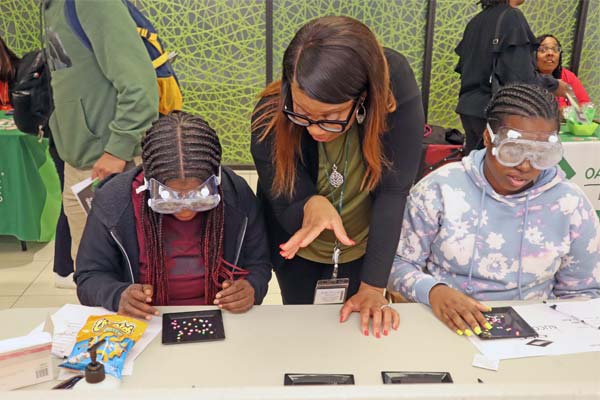With Vaseline-covered goggles over his eyes, OCC student Christopher Burnett tried to sort candies representing pills into different colors on a tray.
After a few minutes, he gave up.
“I can’t even see the plate!” he said. “It’s frustrating. I only separated a few of them.”

Burnett experienced what it’s like to live with glaucoma at the Oct. 23 Practicing Inclusion: Exponential Learning About Disabilities Through Hands-On Activities on the Orchard Ridge campus.
The event was sponsored by OCC’s Office of Diversity, Equity, Inclusion & Justice, ACCESS, Accessibility Advisory Committee, the Mental Health/Social Work department and the Health Sciences and Nursing departments.
“The (glaucoma) exercise helps students understand that with this disability, they could have vision loss and should follow up with a physician,” said Zenet Patten, OCC Associate Dean of Nursing and Health Sciences.
One in six individuals experience a significant disability
According to the World Health Organization, an estimated 1.3 billion people, or 16% of the global population, experience a significant disability, defined as “the interaction between a person's health condition and environmental factors, including accessibility and social support, which hinder the full and effective participation on an equal basis with others.”
Students got first-hand experience understanding these barriers through a variety of stations offered during the event, including:
- Glaucoma: a group of eye conditions that damage the optic nerve and can lead to vision loss and blindness if not treated.
- Schizophrenia: chronic and severe mental health disorder characterized by a disconnection from reality.
- Dyslexia: a learning disability that affects reading and language processing.
- Anxiety: a natural response to stress or danger, characterized by feelings of worry, fear, or unease. When excessive, it can interfere with daily functioning.
- Depression: a common but serious mood disorder that affects how a person feels, thinks, and handles daily activities.
- Hearing loss: an individual may have trouble understanding, following or participating in conversations which can affect their ability to work and communicate with others.
- Attention Deficit Hyperactivity Disorder (ADHD): a developmental impairment of the brain’s executive functions and may cause problems with impulse control, focusing and organization.
- Unsteady Gait: affects the ability to walk steady and may include tripping over an obstacle or limping after an injury.
- Wheelchair Etiquette: basic etiquette includes respecting personal space, avoiding assumptions, listening actively, not leaning on the wheelchair, and being mindful of ramps.
Students were also given a pamphlet detailing each disability, including symptoms, causes and risk factors, diagnosis, treatment, prevention and management, prognosis and resources. Participants received a certificate for visiting all stations.
Exponential learning
“We want students to gain some compassion and empathy and an understanding that sometimes disabilities aren’t always presented as physical,” said Kelli Marks, program coordinator for OCC’s Mental Health/Social Work program. “Let’s be kinder to each other.”
Student Ian Morton tried to put puzzle pieces together at the ADHD station but kept getting distracted by two students blowing bubbles around him. He said everyone in his family except him has some form of ADHD.
“It’s a distraction, and you have to stop and pick up where you left off, and do that over and over and over again every time it happens,” he said. “This gave me a better perspective of what it’s like to live with ADHD.”
Student Santorian Gamble learned the physical demands placed on individuals who use
a wheelchair. He struggled at times as he tried to get the wheelchair to move between
cones set up in the Student Center.
“It’s hard to move around, and you have to make sure you use both hands,” he said.
“It’s very tough.”
For more information, contact OCC’s Office of Diversity, Equity, Inclusion and Justice.
About OCC
Oakland Community College offers nearly 100 degrees and certificates programs with the resources students need to be successful and advance our community. As a top transfer institution, OCC offers one of the state’s most affordable tuition rates and flexibility in scheduling with face-to-face and online options. The College is nationally recognized for its high-demand career training with expert faculty in their fields. More than 1 million students have enrolled in the College since it opened in 1965. Learn more at oaklandcc.edu.
###
Media Contact: Marketing & Communications | 248.341.2020 | contactus@oaklandcc.edu